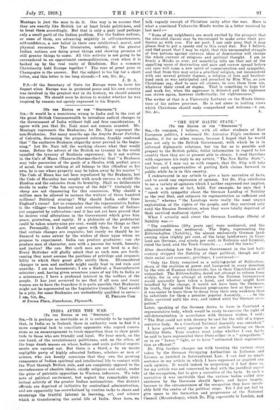INDIA AFTER THE WAR.
(To THE EDITOR or THE "SPECTATOR."] Sia,—It is perhaps as inevitable as it is certainly to be regretted that, in India as in Ireland, those in authority seem to find it a more congenial task to conciliate opponents who regard conces- sions as an encouragement to fresh opposition than to show grati- tude to those who are friendly and loyal. We hear much, on the one hand, of the revolutionary politicians, and, on the other, of the huge dumb masses on whose bodies and souls political experi- ments are carried out. But there is a third, a by no means negligible party of highly educated Indians, scholars or men of science, who are keenly conscious that they owe the growing renascence of Indian spiritual and intellectual life to contact with the West through British rule, and are completely opposed to the recrudescence of obsolete ideals, chiefly religious and social, under the guise of patriotic opposition to Western influences. We take note of political excitement, but neglect the remarkable intel- lectual activity of the greater Indian nationalities. Our district officials are deprived of initiative by centralised administration, and are apparently too overwhelmed by routine tasks to share and encourage the fruitful interest in learning, art, and science which is transforming the social life of India. Over here, we
talk vaguely enough of Christian unity after the war. Here is what a convinced Vishnuvite Hindu writes in a letter received by last mail :-
"Some of my neighbours are much excited by the prospect that the educated classes may be encouraged to make arms their pro- fession as with you. For my part, I can only pray that it may please God to put a speedy end to this cruel war. For I believe, and God grant that I may be right, that this unexampled struggle of free nations against outworn ideas of domination will change the whole current of religious and political thought. I am as firmly a Hindu as ever, yet something tells me that out Of the appalling scene of destruction and pain and sorrow spread before our eyes will come a new spirit of commiseration and sympathy, and that from this may arise a practical religion, not inconsistent with our several private dogmas, a religion of love and brother- hood such as was anticipated and preached by Him Who, as you Christians say, died to save all sinners, to save them from sin, whatever their creed or dogma. That is something to hope for and work for, when the aggressor is defeated and the righteous can strive again, however ineffectually, for righteousness."
The writer of that is a University Lecturer on the Hindu litera- ture of his native province. He is not alone in holding views which Christians should easly comprehend and welcome.—! am,


































 Previous page
Previous page